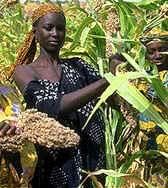Opinion: the leading cause of hunger? Bad regimes
 There is too much food on this planet. So much in fact that leading international experts from health, agriculture, food, education, finance, environmental protection, politics and economics will meet at the McGill University Health Challenge Think Tank on November 7-9 2007 to tackle "one of the most serious threats" to our children’s health and well-being: the global childhood obesity pandemic. Two billion people are overweight, half a billion are obese, and the epidemic is beginning to change the very biology of our offspring. But at the same time, 800 million people in the developing world, especially children, go to bed hungry every day. Clearly, something is very, very wrong.
There is too much food on this planet. So much in fact that leading international experts from health, agriculture, food, education, finance, environmental protection, politics and economics will meet at the McGill University Health Challenge Think Tank on November 7-9 2007 to tackle "one of the most serious threats" to our children’s health and well-being: the global childhood obesity pandemic. Two billion people are overweight, half a billion are obese, and the epidemic is beginning to change the very biology of our offspring. But at the same time, 800 million people in the developing world, especially children, go to bed hungry every day. Clearly, something is very, very wrong.The global food system is highly efficient in feeding people in the wealthy West and the emerging economies. The planet is now putting out enough food to meet the basic, healthy dietary needs of roughly 9 billion people. So how is it possible that there still is such a large number of hungry people? How is it possible that, say, the Democratic Republic of Congo, a country with a capacity to produce food for 2 billion people, cannot feed its own relatively small population? The answers to this question aren't simple. Economists, development thinkers, sociologists and agricultural experts differ on pinpointing the main causes, let alone on how to design policies to tackle the problem. Are agricultural subsidies in the US and the EU holding back food production in the developing world? Are exogenous factors - wars, political instability, volatile markets - to blame? Droughts or floods? The persisting effects of colonialism? A combination of all these factors?
 No, none of these, says Mia Doornaert, a leading Belgian intellectual, in a pretty politically incorrect opinion piece [*Dutch] published recently in De Standaard. According to Doornaert, the main cause of hunger in poor countries is entirely clear: bad local regimes. We don't need complex social sciences to discover this. We don't need a technical debate on the global food system. Forget the subsidies argument, forget the argument about 'imperialism', forget climatic and agricultural arguments, forget the 'bad globalisation' argument. All these reasons are used to create a smokescreen with which people try to hide the most obvious truth: developing countries' own corrupt and incompetent leaders are the main culprits for global hunger - dixit Doornaert.
No, none of these, says Mia Doornaert, a leading Belgian intellectual, in a pretty politically incorrect opinion piece [*Dutch] published recently in De Standaard. According to Doornaert, the main cause of hunger in poor countries is entirely clear: bad local regimes. We don't need complex social sciences to discover this. We don't need a technical debate on the global food system. Forget the subsidies argument, forget the argument about 'imperialism', forget climatic and agricultural arguments, forget the 'bad globalisation' argument. All these reasons are used to create a smokescreen with which people try to hide the most obvious truth: developing countries' own corrupt and incompetent leaders are the main culprits for global hunger - dixit Doornaert.We translate Doornaert's essay because it offers a view many of us are uncomfortable with. Many people doing development work in the South largely tend to blame the West and the past for the ills in today's poor countries. But we must begin to recognize that bad governance could well be the key driver of many of these problems instead. In Europe, Doornaert is seen as a controversial intellectual, because she often succeeds in turning typically 'right-wing' arguments in social debates into left-wing ideas, and vice-versa. We think in this piece she dismisses the effects of 'exogenous' factors a bit too easily, but she's definitely on to something. The argumentation seems simple, but what she says has long been a taboo amongst development workers.
Compassion and empathy were for sale again during the World Day Against Extreme Poverty (October 17), writes Doornaert. But meanwhile, the junta in Myanmar continues to oppress the impoverished Burmese. Mugabe keeps depriving Zimbabweans of food and has ruined the bread basket of Africa. The North Korean regime, which has turned the country into one big slave camp, keeps ferociously starving its people:
 sustainability :: biomass :: bioenergy :: biofuels :: agriculture :: food :: hunger :: economic development :: developing countries :: governance ::
sustainability :: biomass :: bioenergy :: biofuels :: agriculture :: food :: hunger :: economic development :: developing countries :: governance :: These and other tragedies confront us with the most difficult of questions: how does one liberate peoples from catastrophic regimes that don't give a damn about the fate of their populations and systematically ruin entire countries?
The country formerly known as Burma was one of the most prosperous nations in Asia when it gained independence from the United Kingdom in 1948. But generals took power and in 1962 general Ne Win began to push his disastrous 'own way to socialism' - no other continent has experienced the lethality of these 'own ways to socialism' better than Asia.
Zimbabwe was the bread basket of South East Africa when Mugabe came to power in 1980. For a short while, it looked as if he was set to become a new kind of African leader. But 37 years later he holds on to power like some kind of dictatorial madman who terrorises his opponents and his people, and who has destroyed this major African food producing and exporting country.
North Korea was, by far, the wealthiest part of the peninsula after the Korean war of 1953, which divided the nation into North and South. But there too, the 'own way to socialism' has become a stalinist nightmare. In this once wealthy country, hundreds of thousands if not millions have died in famines.
And the world watches and mourns. But none of these tragedies were unavoidable, and one cannot blame the 'usual suspects', such as the colonial past, 'imperialism', or the EU's farm subsidies.
Nobody forced Mugabe to implement an irrational and corrupt political agenda. And it certainly wasn't 'imperialism' which pushed Ne Win and Kim-Il Sung to create their own version of an Asian type of socialism that has claimed millions of lives in Mao's China and in the Khmer Rouge's Cambodia.
In Africa and elsewhere millions of people are food insecure while there is more than enough food on this planet. Millions die of preventable diseases for which there are very simple cures. Millions of women and children have to walk several kilometers each day to fetch drinking water, while a pipeline could easily be build.
And no, all of this isn't the result of the selfishness of the wealthy West, but of the machiavellic obsession with power, the corruption, the incompetence of these countries' own leaders. During the World Day Against Extreme Poverty these factors were left almost entirely out of the debate - something we have become accustomed to.
The Asian 'tigers' who succeeded in gaining prosperity and gradually moved towards more democracy from the sixties and seventies onwards, did not rely on development assistance and foreign aid to get there. Most of these regimes weren't textbook examples of transparency or democracy. But at least their leaders did not rob these countries of their wealth. Instead, they invested in their populations and in their economies. All this was happening while Latin-American and African elites preferred to put the money they stole into European and American bank accounts. The Asian tigers instead invested intensively in education, for boys and girls.
There aren't that many other examples of regimes emulating the success story of the Asian tigers. Oil producing countries are making enormous profits, an amount of money that vastly surpasses that of all foreign aid. But none of these countries invests this money into people. Saudi Arabia prefers to use it to build mosques across the globe. Populists like Iran's president Ahmedinejad and Venzuela's Hugo Chavez spend it on getting votes domestically and on gaining support internationally.
Africa's ills, including the continent's wars and outbursts of violence, don't need a description. But what can we do about them? One thing is clear, we don't have to count on the 'international community', that is the United Nations. Because this institution sides with regimes, not with peoples. Only a handful of governments on this planet really cares about good governance and human rights. The UN reflects this state of affairs.
China, one of the five permanent members of the Security Council, demonstrates this well. The country supports the Sudanese and Burmese regimes and shows its neocolonial intentions in Africa, where it buys access to natural resources, from corrupt governments. These regimes are happy to work with China, because this country doesn't intervene in 'internal affairs', nor does it demand governments to meet good governance basics, as Europe would do.
China profits while Europe is merely good enough to pump foreign aid into these countries, whose refugees it has to accept at its borders. Europe's soft-power may be well-intentioned, but in practise it is powerless. Powerless against regimes which are the single biggest cause of poverty, hunger and misery.
Next we will be publishing an overview of a vision diametrically opposed to Doornaert's. It is based on Jonathan Krieckhaus's analysis of the political economy of development, which he set out in his landmark book 'Dictating Development: How Europe Shaped the Global Periphery'.
Translated by Jonas Van Den Berg for Biopact.
Image (of Doornaert): courtesy of De Standaard.
References:
De Standaard: De eerste oorzaak van honger? Slechte regimes - October 20, 2006.
AlhaGalileo: Changing the global dietary environment Top international experts to meet at McGill conference on childhood obesity - October 25, 2007.
 --------------
--------------
 U.S. oil prices and Brent crude rocketed to all-time highs again on a record-low dollar, tensions in the Middle East and worries over energy supply shortages ahead of the northern hemisphere's winter. Now even wealthy countries like South Korea are warning that the record prices will damage economic growth. In the developing world, the situation is outright catastrophic.
U.S. oil prices and Brent crude rocketed to all-time highs again on a record-low dollar, tensions in the Middle East and worries over energy supply shortages ahead of the northern hemisphere's winter. Now even wealthy countries like South Korea are warning that the record prices will damage economic growth. In the developing world, the situation is outright catastrophic.








0 Comments:
Post a Comment
Links to this post:
Create a Link
<< Home